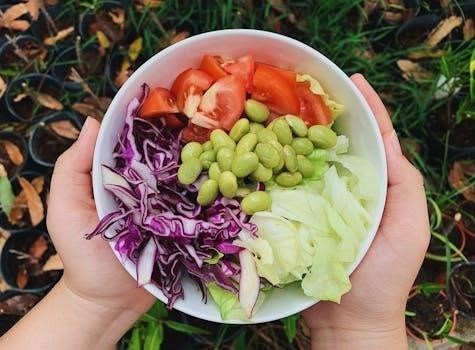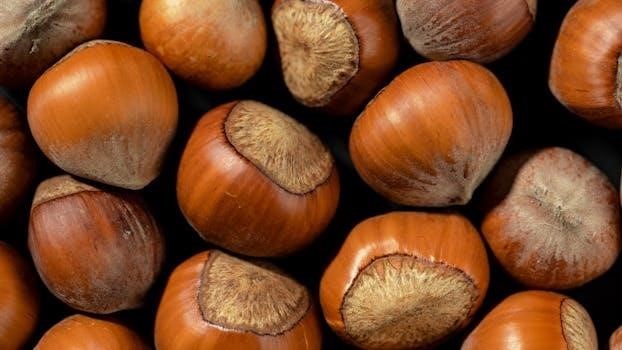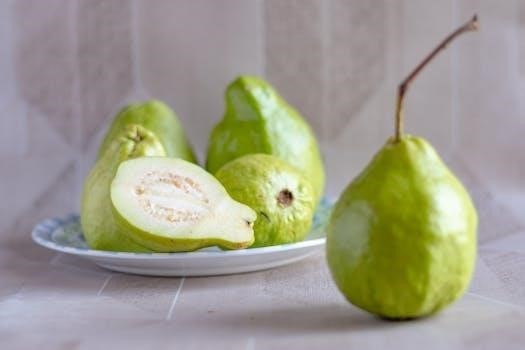
Alkaline Vegan Healing Guide⁚ A Comprehensive Overview
Embark on a journey to wellness with our alkaline vegan healing guide! This overview introduces the principles of alkaline veganism, emphasizing whole, plant-based foods to promote balance and vitality. Discover how this lifestyle can support your overall well-being and health;
The Alkaline Vegan Diet represents a unique intersection of plant-based eating and pH balance, aiming to optimize health through specific food choices. This dietary approach combines the principles of veganism, which excludes all animal products, with the alkaline diet, which emphasizes foods that are believed to promote a slightly alkaline environment within the body.
The core idea behind the alkaline diet is that maintaining a balanced pH level is crucial for overall well-being. Proponents suggest that an acidic environment can contribute to inflammation, digestive issues, and weakened immunity. By focusing on alkaline-forming foods, the diet seeks to counteract these potential negative effects.
This introductory section will delve into the foundations of the Alkaline Vegan Diet, exploring its underlying philosophy, key components, and potential benefits. We will examine how it differs from other plant-based diets, such as the standard vegan diet or the whole food plant-based diet, and provide a framework for understanding its role in promoting a healthier lifestyle. Ultimately, this guide will empower you to make informed decisions about incorporating alkaline vegan principles into your daily life.
The Core Principles of Alkaline Veganism
At its heart, Alkaline Veganism rests on two fundamental pillars⁚ the principles of veganism and the tenets of alkaline eating. Veganism, as a philosophy and lifestyle, excludes all forms of animal exploitation and cruelty, extending to food, clothing, and other purposes. This translates into a diet devoid of meat, poultry, fish, dairy, eggs, and honey.
The alkaline aspect focuses on consuming foods that, upon digestion, leave an alkaline residue in the body. This is based on the belief that maintaining a slightly alkaline pH is beneficial for health. While the body tightly regulates its pH, proponents argue that dietary choices can influence overall well-being.
The main principle involves prioritizing alkaline-forming plant-based foods like leafy greens, vegetables, certain fruits, nuts, seeds, and legumes. Conversely, it restricts or avoids acid-forming foods, including processed foods, refined sugars, and certain grains.
Furthermore, Alkaline Veganism often emphasizes whole, unprocessed foods to maximize nutrient intake and minimize the potential for acidity. Hydration with alkaline water is also frequently encouraged. The ultimate goal is to create a dietary pattern that supports energy levels, reduces inflammation, and promotes optimal health.
Foods to Embrace⁚ Alkaline Vegan Food List
Navigating the world of alkaline vegan cuisine can be exciting, with a vibrant array of delicious and nutritious foods to explore. The cornerstone of this diet lies in embracing alkaline-forming plant-based options that nourish the body and support overall well-being.
Leafy green vegetables take center stage, with spinach, kale, Swiss chard, and romaine lettuce offering a wealth of vitamins, minerals, and antioxidants. Non-starchy vegetables like cucumbers, zucchini, bell peppers, and broccoli provide hydration and essential nutrients. Certain fruits, such as avocados, tomatoes, lemons, and limes, contribute to alkalinity and add flavor to meals.
When it comes to grains, quinoa, amaranth, and wild rice are preferred choices due to their lower acidity. Nuts and seeds like almonds, flaxseeds, and chia seeds offer healthy fats and minerals. Legumes, including lentils and chickpeas, provide plant-based protein and fiber.
Herbs and spices such as ginger, turmeric, and basil enhance flavor and offer additional health benefits. Alkaline water is essential for hydration. By incorporating these foods into your diet, you create a foundation for a balanced and nourishing alkaline vegan lifestyle.
Foods to Limit or Avoid⁚ Understanding Acidic Foods

To effectively embrace an alkaline vegan lifestyle, understanding which foods to limit or avoid is crucial. While this diet focuses on alkaline-forming options, certain foods are considered more acidic and may disrupt the body’s pH balance if consumed in excess.
Processed foods, including packaged snacks, fast food, and refined grains, are generally high in acidity and should be minimized. Sugary drinks, such as sodas and sweetened juices, contribute significantly to acidity and offer little nutritional value. Excessive consumption of acidic fruits like oranges and grapefruit should be monitored;
While grains can be part of an alkaline vegan diet, it’s important to moderate intake of wheat, white rice, and corn, as these are more acidic. Additionally, it’s best to avoid alcohol and caffeine. It is important to note that some healthy foods can be acidic, so moderation is key.
By being mindful of these acidic foods and making conscious choices to limit their consumption, you can better support the body’s natural alkaline balance. This approach allows you to maximize the potential benefits of an alkaline vegan diet.
Potential Health Benefits of an Alkaline Vegan Diet
An alkaline vegan diet, rich in plant-based foods, offers a spectrum of potential health benefits. This dietary approach may contribute to enhanced energy levels, as alkaline foods provide a sustainable energy source, combating fatigue and promoting vitality. The emphasis on whole, unprocessed foods supports healthy digestion and reduces the risk of bloating and indigestion.
Research suggests this diet may play a role in protecting against heart disease, high blood pressure, and stroke by promoting a healthy eating pattern. The abundance of fruits, vegetables, nuts, seeds, and legumes provides essential nutrients, including vitamins, minerals, fiber, and antioxidants, which help repair damaged cells and support overall health.
Moreover, some proponents suggest an alkaline vegan diet may help protect bone density and muscle mass, potentially mitigating the risk of muscle wasting. It is also believed that the anti-inflammatory properties of this diet can help reduce chronic inflammation. The potential benefits extend to kidney health and may even offer some protection against certain types of cancer.

Debunking Myths⁚ Addressing Common Misconceptions
The alkaline vegan diet, while gaining popularity, is often surrounded by misconceptions. One common myth is that it can cure diseases like cancer or AIDS; however, these claims are not scientifically substantiated and have been refuted by legal action in the past. While the diet promotes healthy eating habits, it’s crucial to understand its limitations.
Another misconception revolves around the idea that the diet directly alters the body’s pH level. The body has natural mechanisms to maintain pH balance, and dietary changes have a limited impact on this. The true benefits likely stem from the emphasis on nutrient-rich, whole foods and the reduction of processed foods, high in sodium, fat, and added sugar.
Some believe that all acidic fruits and vegetables are detrimental, but this is not necessarily true. Many of these foods offer valuable nutrients and should not be entirely excluded. A balanced approach is key, focusing on moderation and variety. Finally, it’s important to remember that while the alkaline vegan diet may offer several health benefits, these advantages are primarily due to promoting healthy foods.
Practical Tips for Transitioning to an Alkaline Vegan Lifestyle
Transitioning to an alkaline vegan lifestyle can be a rewarding journey towards improved health and well-being. Start gradually by incorporating more alkaline-forming foods into your current diet. Begin with leafy greens like spinach, kale, and Swiss chard, which are packed with essential minerals. Introduce cucumbers and other hydrating vegetables to support your body’s natural processes.
Plan your meals ahead of time to ensure you have access to approved foods and avoid relying on less healthy options. Explore new recipes that feature alkaline vegan ingredients and experiment with flavors to keep your meals exciting. Focus on whole, unprocessed foods to maximize nutrient intake and minimize potential irritants.
Pay attention to your body’s response to the changes and adjust your diet accordingly. Stay hydrated by drinking plenty of water throughout the day. Be patient with yourself and celebrate small victories along the way. Consider seeking guidance from a registered dietitian or nutritionist to personalize your approach and address any specific needs or concerns.
Sample Alkaline Vegan Meal Plan
This sample alkaline vegan meal plan provides a starting point for incorporating alkaline-forming foods into your daily routine. Remember to adjust portion sizes and food choices based on your individual needs and preferences.
Breakfast⁚ Begin your day with alkaline oatmeal, made with gluten-free oats, almond milk, and a sprinkle of cinnamon. Add a handful of berries for extra antioxidants and flavor. Alternatively, try a green smoothie with spinach, cucumber, apple, and lime.
Lunch⁚ Enjoy a large salad with mixed greens, avocado, tomatoes, cucumbers, and bell peppers. Dress it with a lemon-tahini dressing. Another option is a quinoa bowl with roasted vegetables like zucchini, eggplant, and onions.
Dinner⁚ Prepare a hearty vegetable stew with sweet potatoes, carrots, and lentils. Season with herbs and spices like basil, oregano, and thyme. Alternatively, try a baked sweet potato topped with steamed kale and a drizzle of olive oil.
Snacks⁚ Throughout the day, snack on fruits like apples, pears, or melons. You can also enjoy a handful of almonds or pumpkin seeds. Remember to stay hydrated by drinking plenty of water between meals.
Alkaline Vegan Recipes to Get Started
Ready to dive into alkaline vegan cooking? Here are a few simple and delicious recipes to get you started on your journey. These recipes prioritize alkaline-forming ingredients while ensuring a flavorful and satisfying culinary experience.
Alkaline Green Smoothie⁚ Blend 1 cup of spinach, 1/2 cucumber, 1 green apple, juice of 1/2 lime, and 1 cup of almond milk until smooth. This refreshing smoothie is packed with nutrients and provides a quick energy boost.
Quinoa Salad with Roasted Vegetables⁚ Roast chopped zucchini, bell peppers, and red onion with olive oil, herbs, and spices until tender. Combine with cooked quinoa and a lemon-tahini dressing. This salad is a complete meal with protein, fiber, and essential vitamins.
Sweet Potato and Lentil Stew⁚ Sauté diced onion, carrots, and celery in olive oil. Add diced sweet potato, red lentils, vegetable broth, and your favorite herbs and spices. Simmer until the lentils are tender and the flavors have melded. Serve warm.
Cucumber and Avocado Salad⁚ Dice cucumber and avocado. Dress with lemon juice, olive oil and spices. Serve fresh.

The Dr. Sebi Approach to Alkaline Veganism
Dr. Sebi’s approach to alkaline veganism is a distinct methodology that centers on using specific plant-based foods and herbs to alkalize the body and promote natural healing. It’s rooted in the belief that disease originates from mucus accumulation and acidity within the body.
The Dr. Sebi diet is a vegan diet and prescribes a specific list of approved vegetables, fruits, grains, nuts, seeds, oils, and herbs; Animal products are strictly prohibited. Dr. Sebi believed that certain foods possess the power to cleanse and revitalize the body at a cellular level.
His approach emphasizes consuming natural, unprocessed foods that align with his approved list. This includes vegetables like cucumbers, leafy greens, and bell peppers; fruits like apples and berries; grains like quinoa; and specific herbs known for their alkalizing properties.
It’s important to note that Dr. Sebi initially made claims regarding the diet’s ability to cure various conditions. However, after legal challenges, he was ordered to cease such claims. The diet is now approached as a holistic lifestyle choice.
